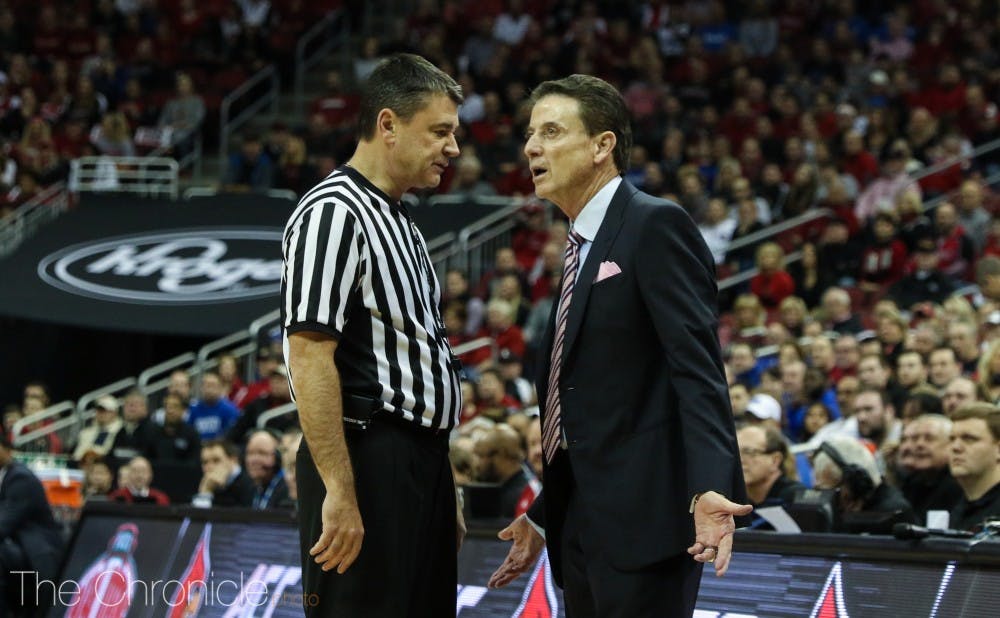For a number of years, there’s been something about Louisville basketball that sucked me in and made me an honorary fan as long as the Blue Devils weren’t on the other side of the court.
There’s a pretty good chance most of the people reading this haven’t travelled to Louisville, and with all due respect to the Midwest, there isn’t much of a reason to. But if there’s one thing I learned in my yearly trip to the KFC Yum! Center—the last two ending in Duke losses—it’s that the region is fiercely devoted to its Cardinals.
All of this has made watching the Louisville program embroiled in scandal and shame (again) even tougher. Although the school wasn’t named in an FBI report last week that charged 10 people for fraud and corruption, the Cardinals are likely to be implicated due to evidence that recruit Brian Bowen was paid $100,000 to sign with the program.
The most recent developments are another black eye for a sport that has been caught in the riptide of changing times.
It’s especially saddening because the Cardinals have always epitomized college basketball to me. On the court, Louisville has embraced a tenacious, full-court press defense that thrives off of turnovers and only makes sense in the college game. The same aggressiveness is present on offense, where the Cardinals ditched a conventional offense—occasionally frustrating their own fans—for a drive-and-kick game facilitated by often undersized guards. Combined with a raucous home crowd, the team has proven to be a tough matchup for almost anyone who faced them.
As the line between college basketball and the NBA continues to blur in the one-and-done era, Louisville has been built on the shoulders of players dedicated to staying in school and improving their game. Guard Donovan Mitchell became the program’s first lottery selection since 2009 when he was chosen 13th in this summer’s NBA Draft, and the Cardinals have not had a former player make an NBA All-Star Game since 1975.
Yet Louisville has been one of the most successful programs in the sport, racking up six Elite Eight appearances, three Final Fours and a national title since 2001, when Rick Pitino took the helm.
No story about the Cardinals would be complete without mentioning Pitino. He landed at Louisville five years after coaching rival Kentucky to a national championship, but fresh off an unsuccessful NBA stint with the Boston Celtics. Sleazeball, cheater, jerk—all those terms are valid for a head coach with questionable character that somehow escaped termination during two earlier scandals before he was fired last week.
There’s also no question that Pitino—who remains the only coach ever to win an NCAA title at two different schools—was one of the great minds in the college game.
With his coaching career likely over, the 65-year-old will go down as a coach who was always capable of extracting more from less. The Cardinals only signed two five-star recruits during Pitino’s 16-year run, instead relying on lower-ranked players that would fit into their system. In his time at Kentucky, Pitino resurrected a program that was recovering from its own NCAA recruiting scandal.
Although Pitino tried his hand in the NBA, he brought an intensity and fire to the Louisville sidelines that distinguished college basketball from its professional counterpart. College basketball is a game of emotion, and you’d be hard pressed to find someone who believes Pitino did not bring emotion to his team’s huddles. This is the same guy that had to be restrained in an argument with a North Carolina fan last season.
But the most sobering reality of Louisville’s predicament in the light of the FBI’s investigation is the fact that the pay-for-play scandal symbolizes college basketball as much as anything we’ve seen on the court. Any college basketball fan will tell you that deep down, the results of the investigation are not shocking. Dirty recruiting tactics have always been the sport’s version of steroids in baseball.
With the NCAA making hundreds of millions of dollars off of collegiate athletes, there is money to be made in the sport. Whether players should get paid is a discussion for a later time, but there’s no question that the current system leaves athletes short of the share they deserve. But the prominence of the AAU circuit and the access it gives athletes to financial managers and shoe companies has helped players and schools skirt the sport’s bylaws for years.
“The landscape of basketball for a player from middle school, high school, college, pros, keeps changing,” Duke head coach Mike Krzyzewski said during Tuesday afternoon’s media session. “We in college have not changed as much as the landscape has changed. We don’t have a model that fits what’s happening in basketball. We are not running this the way a billion-dollar industry should be run. We’re putting a circle into a square.”
There are definitely teams out there that have recruited the right way, but it has never been more apparent that the NCAA is in need of systemic changes. Within the ACC alone, Syracuse, Louisville and North Carolina have faced NCAA scandals, and Miami could be next after also landing in the FBI report.
“Nobody has the solution, but a whole bunch of people have the ideas,” Krzyzewski added. “How do we figure it all out and who figures it out? There’s no who, there’s a group called who, but they don’t figure out this particular thing. The NBA has to be involved, the players union, the shoe companies, college.”
It remains to be seen how aggressively the FBI will pursue other programs now that it has made its message clear. Pitino could go down as the tip of the iceberg or the martyr who fell on the FBI’s sword and forced the NCAA to clean up its act.
Mitchell Gladstone contributed reporting.
Get The Chronicle straight to your inbox
Signup for our weekly newsletter. Cancel at any time.

